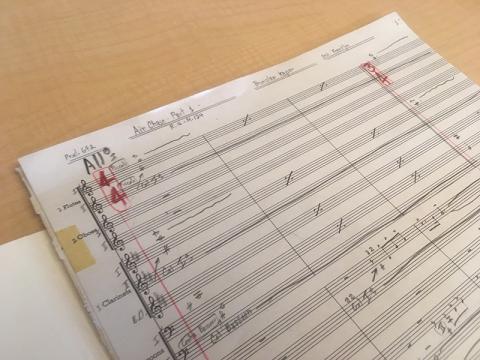
Melise Leech is a processing assistant working on the "Inventing Hollywood: Preserving and Providing Access to the Papers of Renegade Genius Howard Hughes" joint project sponsored by the UNLV Libraries Special Collections and Archives and the UNLV Department of Film, which is funded by a generous grant from the National Endowment for the Humanities.
What is a movie without a musical soundtrack? Movie music does more than provide background; in the hands of talented composers and orchestrators, it brings life to the story and acting, often lending the audience dramatic and emotional cues. A couple falling in love becomes more touching with the romance of strings and woodwinds. An electrifying chase is powered by the pulsing, driving beat of brass and percussion. A climactic rescue, a heart-breaking loss, a side-splitting series of comedic pratfalls – all made complete through the talents of the composers and orchestrators who create music for the movies.
The “Golden Age” of Hollywood music is generally set between 1930 and 1950, a period that coincided with the significant immigration of composers from war-torn Europe. It was also a period when movie studios employed most composers and musicians in Hollywood, working under similar rules as studio actors. This system of employment was so controlling, that, having composed and conducted an Oscar-winning soundtrack, a studio composer might see the recognition and the award go to the studio music department. Even so, many musicians and composers produced astonishing film music, despite the drawbacks of the studio system.
The Howard Hughes Motion Picture Papers (MS-01036) contains six largely complete musical scores from some of Hughes’ better-known films produced between 1929 and 1957. Particularly well represented are Hell’s Angels (1930) and The Conqueror (1956). Howard Hughes originally produced and directed Hell’s Angels as a silent film in 1929 before turning it into a “talkie” in 1930, and the collection features scores for both the silent and sound versions of the motion picture. Adolf Tandler and Sigurd Frederiksen composed and orchestrated the primary score; Tandler also arranged the foreign distribution versions of the soundtrack. Later, the United Artists chief musical director, Hugo Riesenfeld, arranged additional instrument parts for the sound version of the film.
Two decades after Hell’s Angels, Hughes went on to produce the “medieval-western,” The Conqueror, in 1956. Starring John Wayne as Genghis Khan, the film was moderately popular with audiences and almost universally reviled by critics, except for the music soundtrack. The scores, composed by Victor Young and orchestrated by Leo Shuken and Sidney Cutner, include full and condensed conductor’s scores, instrument parts, and spotting cue sheets for most of the compositions. Most sheets also include handwritten annotations and edits.
Rounding out the collection are scores from The Age for Love (1931), composed by Alfred Newman; The Outlaw (1943), composed by Victor Young; The Sin of Harold Diddlebock/Mad Wednesday (1947) composed by Werner Heymann; and Jet Pilot (1957), composed by Branislaw Kaper.
About the National Endowment for the Humanities
Created in 1965 as an independent federal agency, the National Endowment for the Humanities supports research and learning in history, literature, philosophy, and other areas of the humanities by funding selected, peer-reviewed proposals from around the nation. Additional information about the National Endowment for the Humanities and its grant programs is available at: www.neh.gov.


